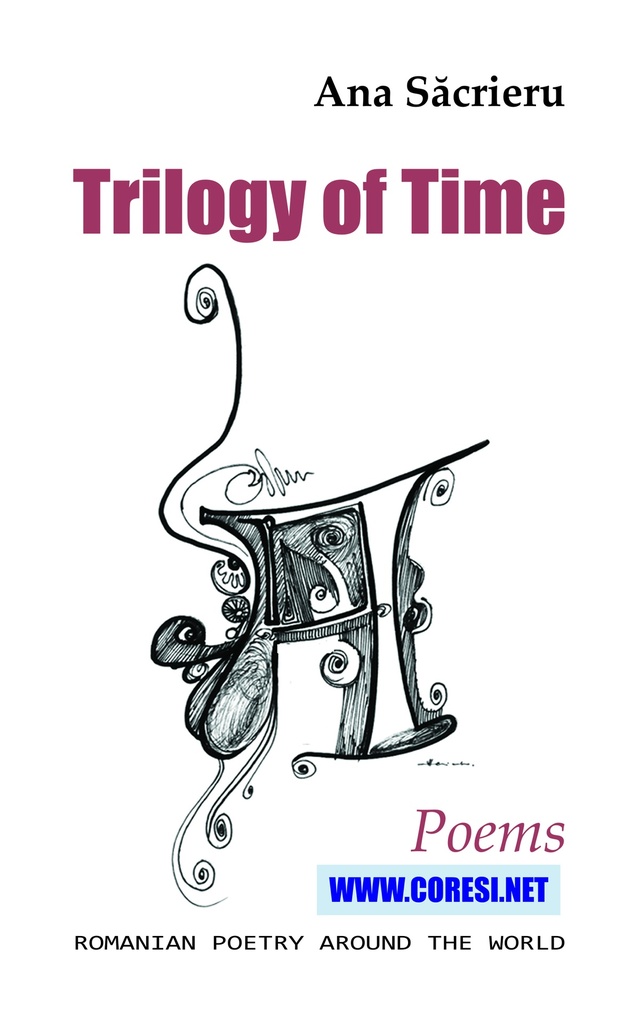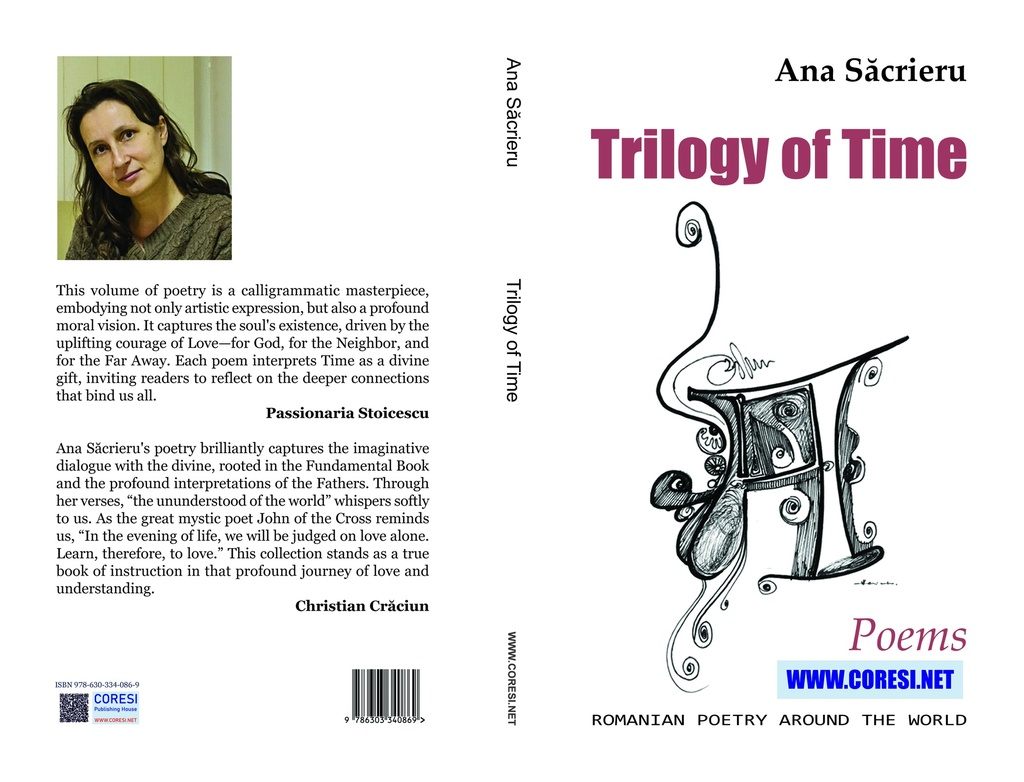Trilogy of Time
Titlu: Trilogy of Time. Poems
Romanian Poetry Around the World
Autor: Ana Săcrieru
Translated from the Romanian by Vasile Poenaru
ISBN 9798884376656
The paperback, digital, and audio book editions can be accessed via this link: https://amzn.to/4smHkfi
This poetry creates a sensation of density, through living the same images and focusing on the essential elements of poetic and existential experience. God's world is a simple world. For those who have found the center in the heart. Here, the role of comparison must also be observed in this poetics. Have you ever wondered how this simple figure of speech, comparison, is possible? It has a theological implication, because if the universe lacked a harmonious structure and language lacked coherence, we simply could not compare things.
Comparison, fundamentally, reunites, as in the ancient myth, the split parts of being into an original Whole:
“The search for the Whole
of our being
is the immense longing
of the eternity of life.”
A space is suggested here, it is precisely the space in which such a poetry lives—these distances of the heart, auto-contemplation in its own rhythm, which is the rhythm of life. And the underlying metaphor of bearing fruit also presupposes, of course, symbolic meanings to be sought far away, in well-known parables. In this context, time is “what has been given to us,” the measurable (see the excellent poem “Sky Eyes") speaks, or lets us talk, about eternity. It has long been known that the sensitive antenna of the poet perceives the silence of being (another poem is named this) which he transmits to us in words.
And when the poem is profound, the words do not disturb this silence. This “seizure"—whose drama is subtly conveyed between the lines—is part of a poetics of memory and giving. And this silence of being, we are warned, “completes the path.”
Love comes, on this path, to be energy and guide, a “moment without time.” It comes to overcome gravity through grace.
“My love doesn't exist.
It's just the light from my soul.
It's the fall that only births fear.
There's only the sleep of heavy longing.”
This adjective of weight, heavy, appears dozens of times in the volume, and this is very significant. It belongs, as I said at the beginning, to the profound law of the polarity of being. And love, here confused with even the wind, overcomes this weight.
“The absence of the word
that scatters
the weight of the earth
is heavy earth to me,
the silence of the thought
hidden behind time
and the soul's cry—extinguished
by the tear of the wind.
They're heavy earth to me
all of those
and alone, only kindness
would easily separate them
from their sad, unutterable, weight.”
“That's how I believed
that love is blue, but you knew that
the earth remains earth in love.”
Love does not exclude suffering, or the assumption of suffering by the “psalmists of eternity": “A brake presses my gaze / it's you, man, who've been a wound to me” or: “Mine / remains the crust / of dried blood / from your wound” or: “nevertheless we are a cross / so that everything around us // may no longer separate us...” Some poems evoke the wisdom found in parables, and this also belongs to the Christian humility, to the detachment of the self. See the poems “The Entirety of the Pelican” or “We Were Already Seeds". Or this image of the solitude of the word:
“Last night,
I carried
my loneliness
through all meanings.”
So time is the gift that God has made to us to set out on the journey towards Him. Therefore, time marks the original tearing of being between soul and tangible matter.
“The tearing of time itself
is my tearing from you.
Like a chasm
of loneliness seen from above,
from the peaks.
You and I an endless sky.
[...]
“Our sky is torn,”
sighed the peak from above the chasm.”
Ana Săcrieru's poetry is a brilliant realization of the imaginative universe of dialogue with the divine, established through the Fundamental Book and the comments of the Fathers on it. “...the ununderstood of the world” comes thus to speak to us softly, in the ear. Those who have ears to hear... will hear... Let us conclude with the saying of the great mystic poet John of the Cross: “In the evening of life, we will be judged on love alone. Learn, therefore, to love.” In this respect, we have here a book of instruction.
Christian Crăciun




![[978-973-137-268-6] Fecioara și Sufletul](/web/image/product.product/8810/image_128/%5B978-973-137-268-6%5D%20Fecioara%20%C8%99i%20Sufletul?unique=40a2627)
![[978-973-137-267-9] Trilogia timpului. Poezii](/web/image/product.product/5070/image_128/%5B978-973-137-267-9%5D%20Trilogia%20timpului.%20Poezii?unique=9a8845f)
![[978-606-001-534-5] Vara nemuririi noastre](/web/image/product.product/8917/image_128/%5B978-606-001-534-5%5D%20Vara%20nemuririi%20noastre?unique=028b5c9)